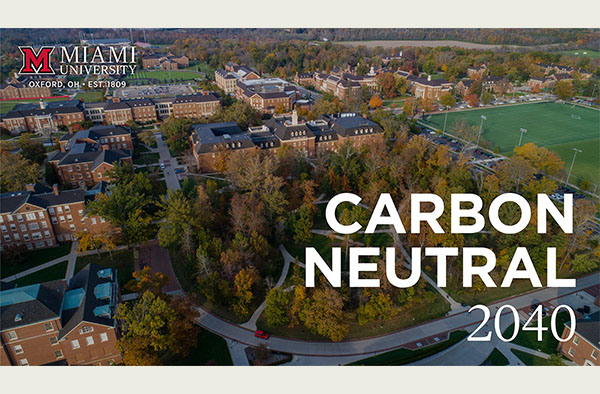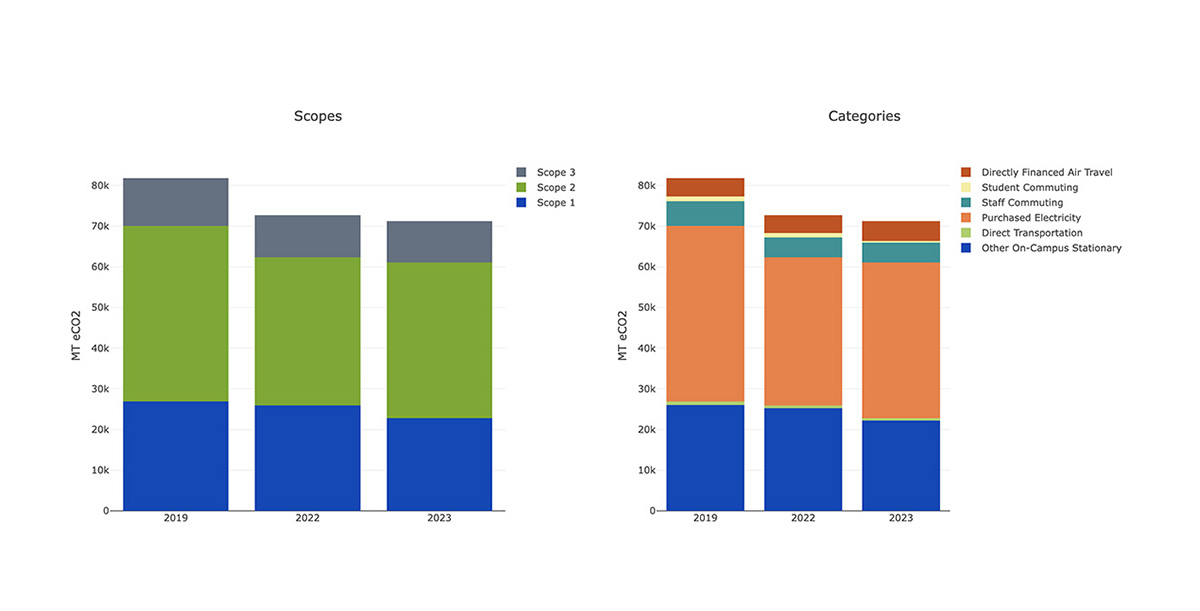Miami University commits to carbon neutrality by 2040
The Miami 2040 Climate Action Plan, currently under review, outlines goals and actions to reach carbon neutrality on the Oxford campus

Miami University will become carbon neutral by 2040, Miami University President Gregory Crawford announced during his State of the University address Oct. 3.
The “Miami 2040: Climate Action Plan for Miami University'' outlines the goals, targets, and actions required to reach net carbon neutrality on Miami’s Oxford campus. The plan was recently submitted to President Crawford’s office for review.
President Crawford signed the Presidents’ Climate Leadership Commitments (PCLC) – Climate Commitment in September, 2020. Within three years of signing the commitments, the PCLC requires signatories to draft a Climate Action Plan and establish a date to reach carbon neutrality for their campus.
Once approved by the Miami University Board of Trustees in the spring, the Miami 2040 Plan will be submitted in May 2024 to Second Nature, the organization responsible for the PCLC. Second Nature works with hundreds of colleges and universities to help make principles of sustainability fundamental to every aspect of higher education.
The Miami 2040 Plan was drafted from the recommendations of the subcommittees of the Climate Action Task Force and a Public Service Project team of Masters of Environmental Science (MEn) students.
It was written by the co-chairs of the Climate Action Task Force and Sustainability Committee — which for the 2023-2024 academic year combined to form the Climate Action and Sustainability Council — Susan Meikle, University Communications and Marketing writer and sustainability communications manager; Jonathan Levy, director of the Institute for the Environment and Sustainability and associate professor of Geology, and Olivia Herron, director of sustainability.
Between now and January, they will present information sessions about the Miami 2040 Plan to groups across campus and solicit and integrate feedback from key campus stakeholders.
Miami 2040 Climate Action Plan strategies
The PCLC-Climate Commitment requires reaching net carbon neutrality in these areas: Emissions associated with fuel combustion on campus, including power production and the campus fleet (Scope 1); emissions from purchased electricity (Scope 2); and emissions from faculty, staff, and students commuting to campus and university-financed air travel (Scope 3).
The Miami 2040 Plan strategy areas are:
- Decarbonizing Miami’s campus: energy-based emissions
- Emissions from commuting and university-financed air travel
- Offsetting Miami’s carbon emissions
- Education and research
- Student engagement and outreach
- Resilience monitoring

Decarbonizing Miami’s campus: energy-based emissions
Most of Miami’s carbon emissions are from energy used for heating and cooling its buildings.
Miami’s path to carbon neutrality began with its historic residence halls (Elliot and Stoddard) in 2010, when they were converted off steam to geothermal heating and cooling. Since then, Miami’s Utility Master Plan provided a roadmap for the transformation of nearly all the building heating and cooling systems off steam.
The latest energy transformation project was completed in August. This was a year-long project that converted nine buildings in the center academic quad from steam heating systems to energy efficient heating hot water (HHW) systems.
Since 2008 Miami has reduced its energy-based carbon emissions per gross square foot by nearly 60% and total energy-based carbon emissions by more than 45%.
- The Miami 2040 Plan strategy to decarbonize our energy-based emissions is to further reduce energy consumption, complete the transition of building heating and cooling systems off steam; produce zero-emissions energy on-site; procure purchased electricity from renewable sources; and offset the remainder.
Building a culture of sustainability
Reaching Miami’s carbon neutrality goal will require building a campus culture of sustainability, beyond reducing energy-based emissions, said Herron, who is collaborating with the Office of Student Life and other groups to help implement goals for campus engagement and outreach.
She recently received funding from the Ohio EPA Recycling and Litter Prevention Grant program to implement the new OSCAR Smart Waste Stations located in Armstrong Student Center. This system helps students sort compost, recycling, and landfill waste. Herron is also working with Armstrong Student Center and Dining services in piloting a composting program for food waste, which is diverting more than 1,000 pounds of back-of-the-house food waste from landfills weekly.
Levy is working to help implement goals for climate education and research, which include Integrating sustainability across the curriculum; developing new
Sustainability degree, microcredential or certificate programs; and creating a new Center for Climate Change Studies.
“Implementation of the Miami 2040 Plan will require embedding sustainability across all units on campus,” Meikle said.
Campus-Community Resilience Assessment
The PCLC-Climate Commitment includes both a Carbon Commitment plus a Climate Resilience Assessment. The Climate Action Task Force submitted Miami’s Campus Community Resilience Assessment to Second Nature in August.
The Climate Action Task Force Resilience subcommittee, with two Masters of Environmental Science student Public Service Project teams, helped to conduct the Resilience Assessment with input also from students in the courses GHS 301 (2021), GLS 435/535 (2023), and BIO 710 (2022).
The Resilience Assessment helped to identify Miami’s strengths and vulnerabilities in different dimensions of resilience to climate change — such as infrastructure, emergency plans and communications, housing, and other areas. The assessment targets indicators to strengthen climate resilience on the Oxford campus and identify areas and opportunities to partner with the city of Oxford and Butler County to strengthen resilience community-wide.